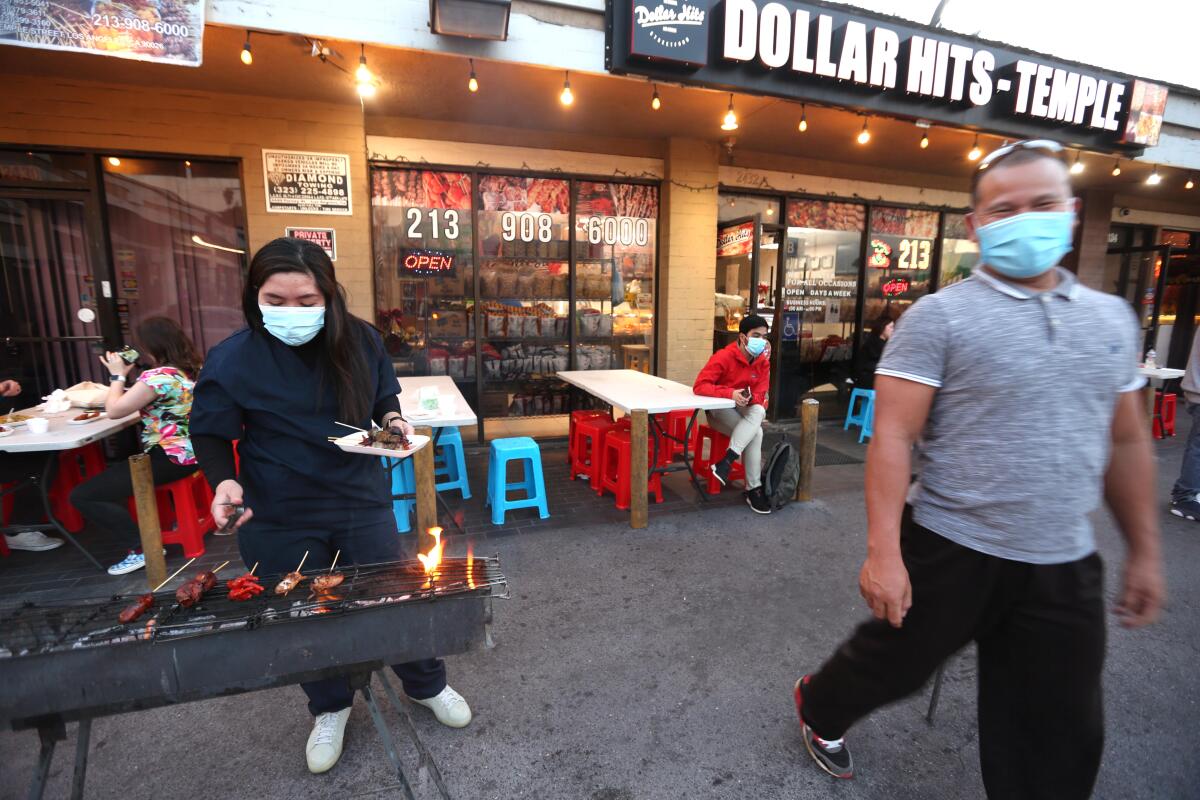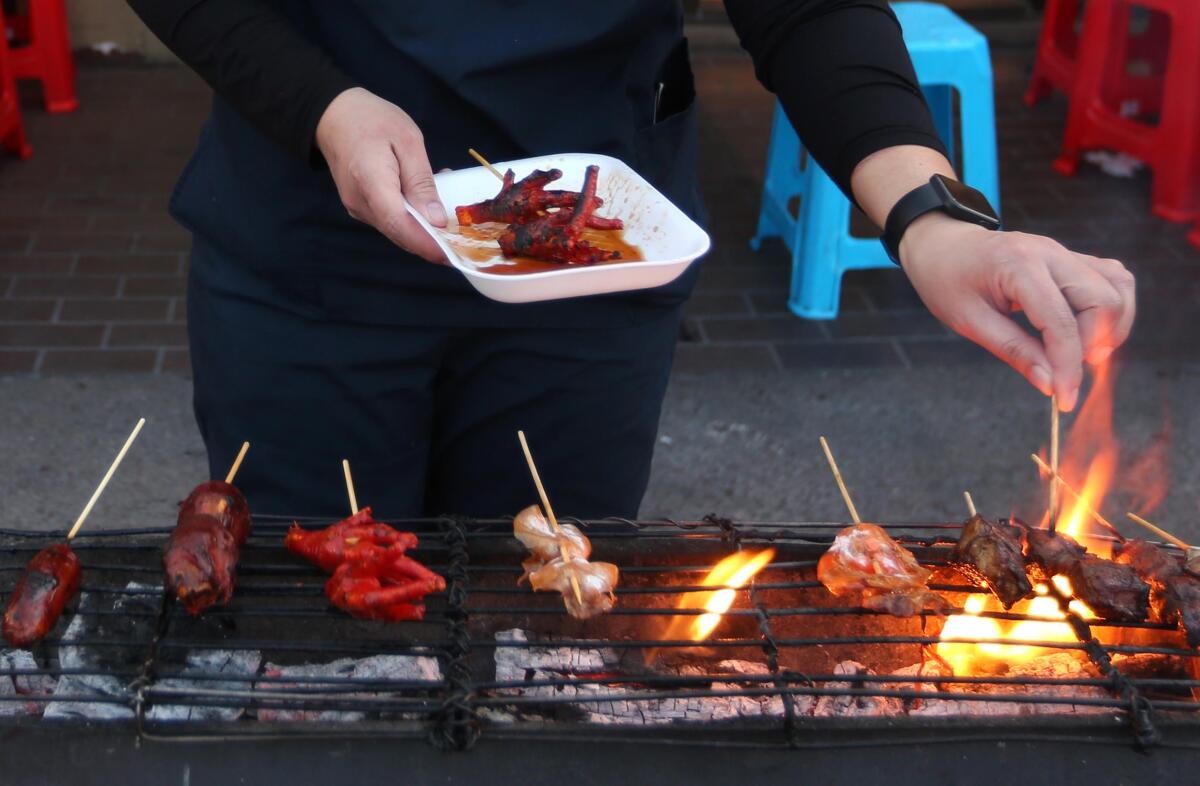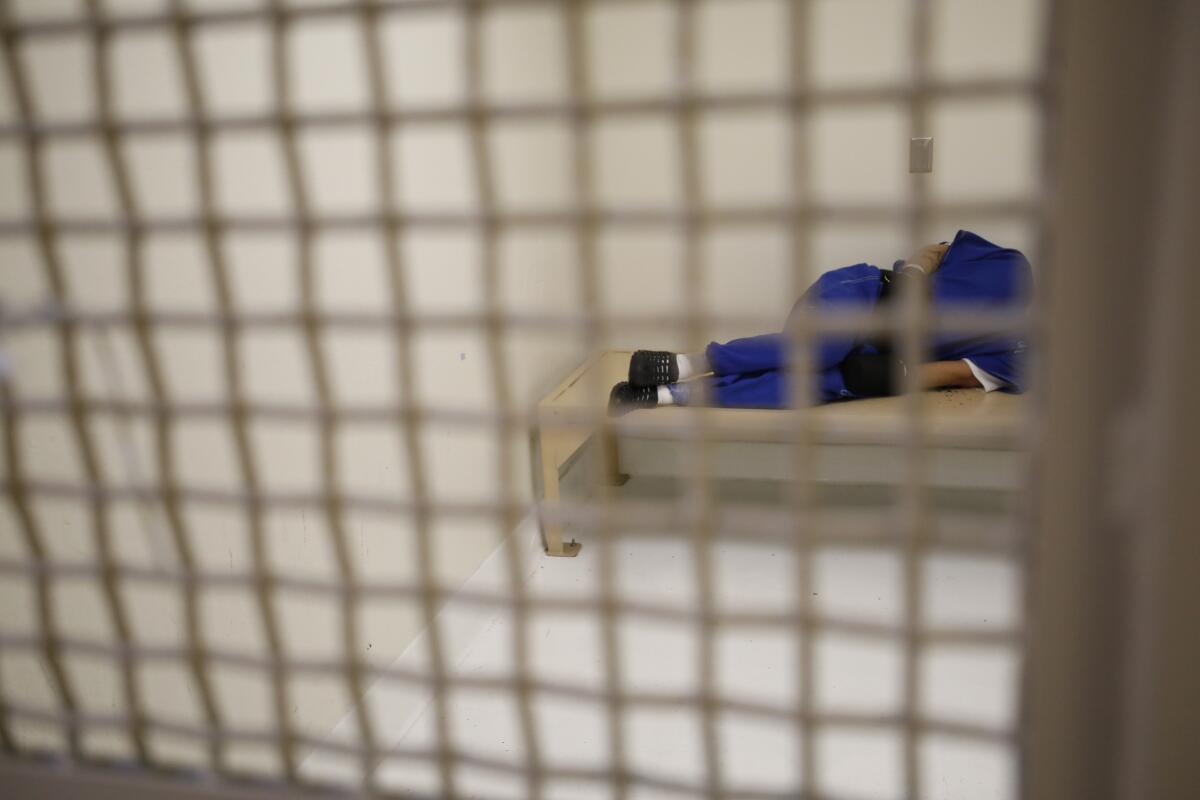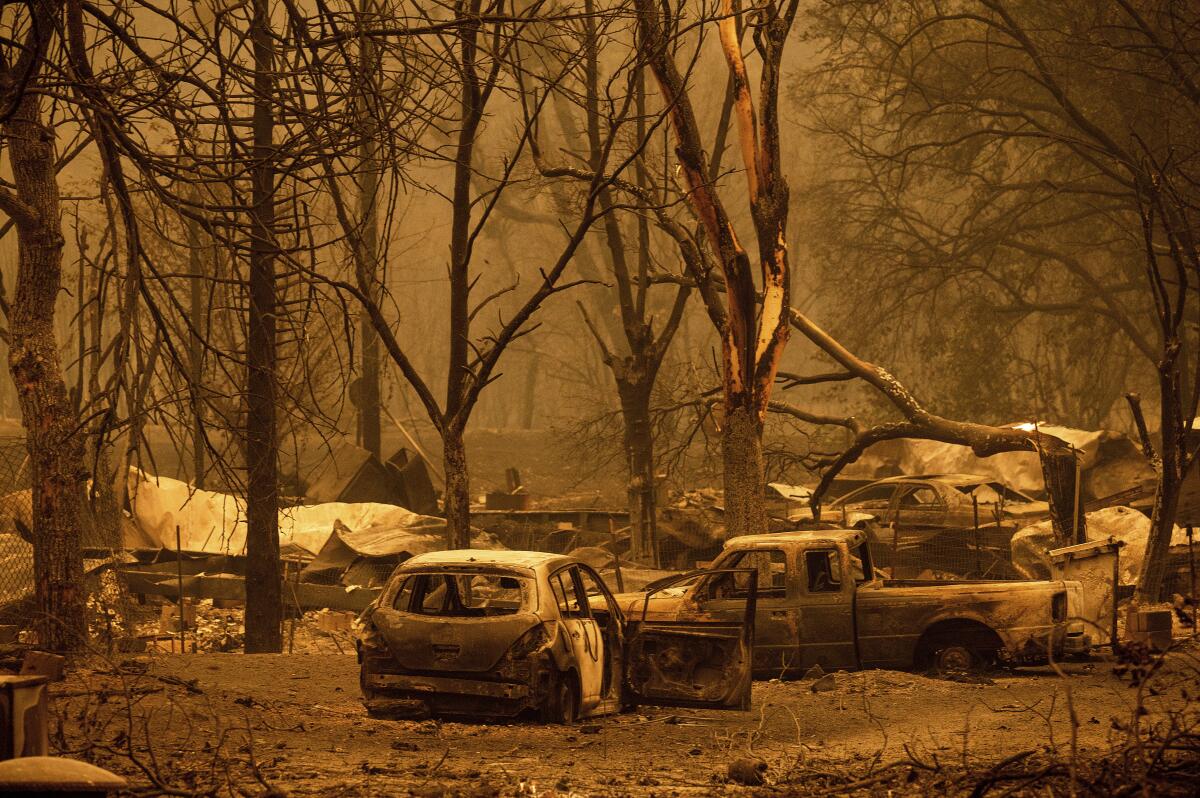A popular Filipino restaurant gets on a Netflix show. What happens next?

- Share via
Good morning, and welcome to the Essential California newsletter. It’s Monday, Aug. 1. I’m Jonah Valdez, a breaking news reporter.
Few things bind L.A.’s Filipino American community together like skewered meat sizzling on charcoal grills that line the parking lot of a tiny strip mall on Temple Street.
Named after its accessible price of $1 per skewer, the restaurant Dollar Hits anchors the strip mall in Historic Filipinotown, a primarily working-class neighborhood that is fighting gentrification. Many of those who come to Dollar Hits are searching for familiar tastes of home, while some Filipinos born and raised in the U.S., like me, are hoping to connect with a place they never knew.
And on the last Friday evening of July, my most recent visit, dozens of customers had packed the place as densely as the rest of its Central L.A. neighborhood.
Though it’s normally busy on weekends, the restaurant had drawn some new faces after Netflix had just dropped the latest season of its docuseries, “Street Food,” and Dollar Hits was highlighted in the first episode. After making a name online through social media posts and food bloggers on YouTube over the last several years, Dollar Hits and its owners were now captured by the sleek cinematography of much larger camera crews and budgets.
I squeezed through the outdoor, communal-style seating — reminiscent of that common in cities such as Manila, rows of folding tables and plastic stools where families and friends sit intimately alongside strangers — and I filed into a line that leaked from the restaurant’s doors.
There, I met a first-timer, a man who drove more than two hours from Bakersfield with his wife and kids because they missed the street food of Manila, and an Anaheim woman who had recently returned from a trip visiting family in the Philippine province of Pampanga. She said she had come to satisfy a craving and longing for home.
“I live in Santa Clarita, and there’s not much out there,” said Trystan Santos, another first-timer who was born and raised in Quezon City and moved to the U.S. nine years ago, after high school. He told me he first heard of Dollar Hits through TikTok videos and then Netflix.
“I’m trying to find a place that would actually remind me of home … a place that would actually get my taste,” Santos said, standing in front of a grill where flames charred the skewers of his favorite meats — deep-fried quail eggs (qwek qwek) and pig intestine (isaw).
Other first-timers were drawn from more expensive L.A. ZIP codes, such as Pablo Rivas, who had come from Brentwood after watching the Netflix episode, excited about the restaurant’s “novelty” and trying “something new.” John and James Weiss, brothers from the Westwood area, said they appreciated the barbecue chicken most, before making a joke about coming to the neighborhood to gentrify it, asking me, “Is that the vibes you got?”
Starting out as a food stand in the same strip mall in 2013, Dollar Hits quickly grew into a food truck, and eventually a brick-and-mortar, buying its current home from another Filipino restaurant.
“I am overwhelmed and I am blessed and grateful,” said Elvira Chan, the founder and owner of Dollar Hits, as I sat next to her as we listened to several of her relatives, all registered nurses, belting a cover of Bonnie Tyler’s “Total Eclipse of the Heart” from a makeshift stage. Her family was here to celebrate the opening of their New York location, which debuts later this month.
Dollar Hits grew during rapid change and gentrification in its neighborhood, which accelerated throughout the 2010s, as Historic Filipinotown’s location near Echo Park and Silver Lake made it a target for new development.
Though the success of Dollar Hits mirrors the boom of development in Historic Filipinotown, its effect on the community could not be more different. As real estate developers drive many working-class Filipinos and Latino residents out of the area, places like Dollar Hits continue to feed the community and invite more Filipinos in.

Doreen Fernandez, a Filipino food historian, suggested that the modern idea of street food in the Philippines is rooted in the interdependence of agricultural and fishing communities, which relied on each other to plant, plow and harvest fields, winnow rice, or mend fishing nets. In this same way, families shared their homes with their communities.
“The homes extended to the streets, where could be found the space in which to sit and chat with neighbors, to play games, to dry [harvested rice], to mend fishnets … to eat and celebrate,” Fernandez wrote in her book, “Tikim.”
Like other members of the Filipino diaspora, Fernandez’s writings helped me place my family’s own history of food and culture in a context.
My grandmother, who was born and raised in a small farming town of Namuac, would share similar memories of holidays where neighbors would leave their doors wide open for one another as people made their way from home to home, stopping to eat around a table set with meals cooked from recent harvests.
Dollar Hits was born out of this street food tradition. And due to its owner’s boisterous hospitality, it continues to grow. During our interview, Chan would stand up and grab the microphone to do her now-infamous rounds, walking from table to table, asking people where they were from, then greeting them aloud, “All the way from the Netherlands! Welcome, Netherlands!” or “Thank you for coming, Virginia!”
Yet as valuable as places like Dollar Hits are to immigrant and diasporic communities, they are not immune to the risk of displacement, whether through gentrification or aggressive laws aimed at street vendors.
Just a few blocks east along Temple Street sits another Filipino restaurant, Chibogs, which used to host kamayan feasts and karaoke nights. Developers will demolish the spot along with the entire Luzon Plaza strip mall. Built in its place will be a five-story apartment complex with mostly luxury units.
“It’s a very valuable location, so they could easily sell it to a developer just like Luzon Plaza,” said Joe Bernardo of the Dollar Hits strip mall, which is located across the street from another luxury apartment complex, built in 2017. Bernardo is an adjunct professor whose research includes Filipino American history in Los Angeles and is an organizer who is part of a coalition that opposes gentrification in the neighborhood.
“The Filipino part of Historic Filipinotown will only survive if the people own the property and are willing to build it for the community,” Bernardo said.
When I told Chan about the fate of Chibogs, she grew serious and recalled the generosity of its owners who supplied Chan with chairs, tables and other equipment when Dollar Hits first started.
Chan said the same wouldn’t happen to Dollar Hits.
She said in five years, she hopes to buy the whole strip mall from the current landlord. Her plan for the strip mall, which includes other Filipino-owned businesses like Temple Seafood Market and a Filipino bakery: She won’t change a thing.
Sign up for Essential California
The most important California stories and recommendations in your inbox every morning.
You may occasionally receive promotional content from the Los Angeles Times.
And now, here’s what’s happening across California:
Note: Some of the sites we link to may limit the number of stories you can access without subscribing.
L.A. STORIES
Less contact tracing amid BA.5 surge. As the super contagious BA.5 spreads, L.A. County has cut back on COVID-19 contact tracing. This summer, contact tracers were reaching and interviewing less than 30% of their assigned cases, well below success rates seen earlier in the pandemic. Many COVID cases are probably never assigned to contact tracers at all as many Angelenos rely on home tests that are never reported to the county. Los Angeles Times
LAUSD students missing from the rolls. Just two weeks before the school year starts, there are an estimated 10,000 to 20,000 students who are not enrolled or stopped attending last year, with the problem most felt in the youngest grades. Los Angeles Unified Supt. Alberto M. Carvalho didn’t lay blame on parents and said it’s on the the district to remove obstacles that are keeping students out of school, such as more accessible transportation and better connection to counseling and other family services. Los Angeles Times
Support our journalism
POLITICS AND GOVERNMENT
Criticisms of Mayor Eric Garcetti and his office were softened or removed from the final version of a report on Los Angeles’ emergency response to the COVID-19 crisis. The 220-page final report, produced for the city by an outside firm, highlight emergency response missteps that led to a breakdown in coordination and communication among city departments. But scrubbed or toned-down in the report were several criticisms, such as references to Garcetti’s weekly cabinet meetings that “often felt more like dictations rather than discussions,” or one from the Emergency Management Department staff who said their tasks may have been “politically driven.” Los Angeles Times

An end to long-term solitary confinement? California lawmakers are considering ending long-term solitary confinement in the state’s prisons, jails and private immigration detention centers. A new bill, AB 2636, would restrict these facilities from holding people in solitary confinement for more than 15 consecutive days and would ban confining pregnant women, people with certain disabilities and individuals under 25 and over 65. Other states such as Colorado have already passed similar laws. And the United Nations also bans 15-day solitary confinement, labeling the practice as torture. Sacramento Bee
CRIME AND COURTS
Our daily news podcast
If you’re a fan of this newsletter, you’ll love our daily podcast “The Times,” hosted every weekday by columnist Gustavo Arellano, along with reporters from across our newsroom. Go beyond the headlines. Download and listen on our App, subscribe on Apple Podcasts and follow on Spotify.
Police are stopping transgender people in California more than cisgender people for “reasonable suspicion.” A new report released by the state attorney general reveals officers list “reasonable suspicion” as their reason for stopping transgender pedestrians and drivers nearly half of the time, which is four times the figure for cisgender people. “Reasonable suspicion” means the officers believed they had justification to suspect the person was probably committing a crime. Transgender people are also far more likely than cisgender people to be searched, handcuffed and arrested and to have force — both lethal and nonlethal — used against them. San Francisco Chronicle
A kangaroo black market in California. After years of unregulated killing of kangaroos, California banned the sale of kangaroo meat and leather in 1970 when Ronald Reagan was governor. But in lawsuits, animal welfare advocates accuse California retailers of ignoring the ban and continuing to sell soccer shoes made from kangaroo skin. Advocates say the so-called K-leather — which is prized for its strength, light weight and suppleness — is the product of a brutal and inhumane system of harvesting that slaughters up to 2 million kangaroos a year. Los Angeles Times
HEALTH AND THE ENVIRONMENT

The McKinney fire grows. A fast-moving wildfire near the California border with Oregon is swallowing heavy, drought-stressed timber in steep terrain in the Klamath National Forest and as of Sunday, had burned 51,468 acres with 0% containment. It’s quickly becoming the largest and most dangerous wildfire this season in California and has forced hundreds to evacuate. Los Angeles Times
A DIY box helps clear indoor air of the coronavirus. One Studio City man created his own filtration device, a combination of fans and filters, to push contaminants — including smoke, dog dander and the unwelcome coronavirus — out of indoor air. The DIY box, which lights up to the beat of music, was created as many people have abandoned masks and as experts have argued that more needs to be done to keep the coronavirus from building in stagnant indoor air. Los Angeles Times
Swim at your own risk. It’s no secret that famous San Diego beaches, Coronado and Imperial Beach, have long experienced pollution issues from nearby Tijuana. The water often turns waves brown and stinky. County public health officials there have always placed yellow and red signs to tell people to stay out of the water when it’s too polluted. But recently, the county is posting new blue “warning” signs, which mean swimmers can enter the waters at their own risk. So how polluted are San Diego beaches when those new signs are posted? The answer’s complicated. San Diego Union-Tribune
CALIFORNIA CULTURE
A “Renaissance” is underway in summer 2022, and we have Beyoncé to thank. From clubs and car speakers, people across California are bumping the new album, which travels across the realm of Black music, blending house, disco and afrobeats, music created by black and Queer people. It will get you moving on the dance floor or in your seat, and is ultimately an expression of Black joy. Los Angeles Times
The legendary Celtic and Oakland native, Bill Russell, died Sunday at 88. He was forever entwined in Lakers history as his Celtics teams in the 1960s dominated the Lakers, defeating them in seven separate NBA Finals. Los Angeles Times
The last full month of summer has just begun. In between the traveling and vacations, we hope you are making quality time for your friends. If you’re looking for a friend date, luckily you don’t have to go very far. Here are 16 places you can go in L.A. Los Angeles Times
August is Black Business Month. And to celebrate, I went to the archives and pulled up this expansive list from 2020 of Black-owned businesses in Los Angeles that you can support now. Los Angeles Times
July was Disability Pride Month. The UC Berkeley chapter of the Disabled Journalists Assn. put together a Twitter thread to celebrate the work of disabled journalists, one article for each day of the month. Twitter
Free online games
Get our free daily crossword puzzle, sudoku, word search and arcade games in our game center at latimes.com/games.
CALIFORNIA ALMANAC
Los Angeles: Partly cloudy, 83. San Diego: Sunshine, then cloudy skies, 78. San Francisco: Cloudy, then partly cloudy, 70. San Jose: Cloudy, then partly cloudy, 81. Fresno: Cloudy, then partly cloudy, 100. Sacramento: Cloudy, then partly cloudy, 92.
AND FINALLY
Today’s California memory comes from Jeff McLoughlin:
In 1969, my engineer father secured a job with Lockheed to work on the Apollo space program. Our family of five relocated from Connecticut and stayed in a North Hollywood motor inn while my parents looked for a home. Summer in L.A. was such a departure from the leafy green of New England, hot and extremely smoggy as it was in the late 1960s. My 10-year-old brother and I entertained ourselves running up and down the balcony overlooking the parking lot of that cheesy motel. One July day my father called us to the doorway to watch the motel’s tiny black-and-white TV just as Neil Armstrong set foot on the moon. Even at that age it was a moment of awe and wonder for me. Los Angeles was a whole new world.
If you have a memory or story about the Golden State, share it with us. (Please keep your story to 100 words.)
Please let us know what we can do to make this newsletter more useful to you. Send comments to [email protected].
Sign up for Essential California
The most important California stories and recommendations in your inbox every morning.
You may occasionally receive promotional content from the Los Angeles Times.




